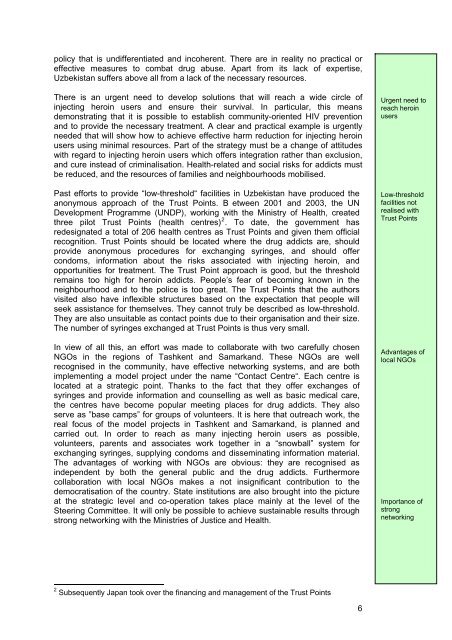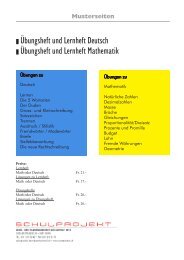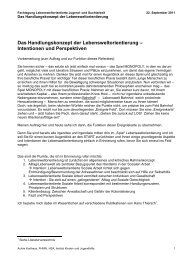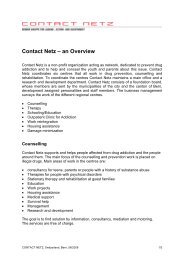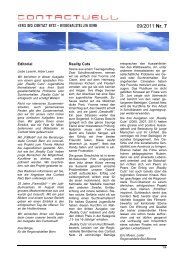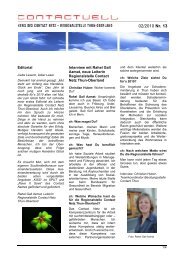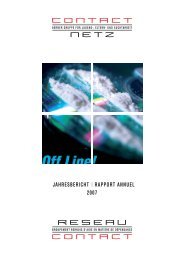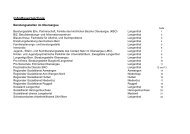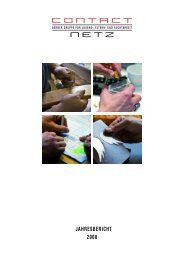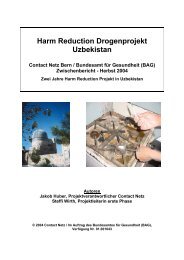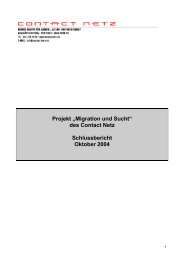Harm Reduction Drug Project Uzbekistan - Contact Netz
Harm Reduction Drug Project Uzbekistan - Contact Netz
Harm Reduction Drug Project Uzbekistan - Contact Netz
You also want an ePaper? Increase the reach of your titles
YUMPU automatically turns print PDFs into web optimized ePapers that Google loves.
policy that is undifferentiated and incoherent. There are in reality no practical or<br />
effective measures to combat drug abuse. Apart from its lack of expertise,<br />
<strong>Uzbekistan</strong> suffers above all from a lack of the necessary resources.<br />
There is an urgent need to develop solutions that will reach a wide circle of<br />
injecting heroin users and ensure their survival. In particular, this means<br />
demonstrating that it is possible to establish community-oriented HIV prevention<br />
and to provide the necessary treatment. A clear and practical example is urgently<br />
needed that will show how to achieve effective harm reduction for injecting heroin<br />
users using minimal resources. Part of the strategy must be a change of attitudes<br />
with regard to injecting heroin users which offers integration rather than exclusion,<br />
and cure instead of criminalisation. Health-related and social risks for addicts must<br />
be reduced, and the resources of families and neighbourhoods mobilised.<br />
Past efforts to provide “low-threshold“ facilities in <strong>Uzbekistan</strong> have produced the<br />
anonymous approach of the Trust Points. B etween 2001 and 2003, the UN<br />
Development Programme (UNDP), working with the Ministry of Health, created<br />
three pilot Trust Points (health centres) 2 . To date, the government has<br />
redesignated a total of 206 health centres as Trust Points and given them official<br />
recognition. Trust Points should be located where the drug addicts are, should<br />
provide anonymous procedures for exchanging syringes, and should offer<br />
condoms, information about the risks associated with injecting heroin, and<br />
opportunities for treatment. The Trust Point approach is good, but the threshold<br />
remains too high for heroin addicts. People’s fear of becoming known in the<br />
neighbourhood and to the police is too great. The Trust Points that the authors<br />
visited also have inflexible structures based on the expectation that people will<br />
seek assistance for themselves. They cannot truly be described as low-threshold.<br />
They are also unsuitable as contact points due to their organisation and their size.<br />
The number of syringes exchanged at Trust Points is thus very small.<br />
In view of all this, an effort was made to collaborate with two carefully chosen<br />
NGOs in the regions of Tashkent and Samarkand. These NGOs are well<br />
recognised in the community, have effective networking systems, and are both<br />
implementing a model project under the name “<strong>Contact</strong> Centre“. Each centre is<br />
located at a strategic point. Thanks to the fact that they offer exchanges of<br />
syringes and provide information and counselling as well as basic medical care,<br />
the centres have become popular meeting places for drug addicts. They also<br />
serve as ”base camps” for groups of volunteers. It is here that outreach work, the<br />
real focus of the model projects in Tashkent and Samarkand, is planned and<br />
carried out. In order to reach as many injecting heroin users as possible,<br />
volunteers, parents and associates work together in a “snowball” system for<br />
exchanging syringes, supplying condoms and disseminating information material.<br />
The advantages of working with NGOs are obvious: they are recognised as<br />
independent by both the general public and the drug addicts. Furthermore<br />
collaboration with local NGOs makes a not insignificant contribution to the<br />
democratisation of the country. State institutions are also brought into the picture<br />
at the strategic level and co-operation takes place mainly at the level of the<br />
Steering Committee. It will only be possible to achieve sustainable results through<br />
strong networking with the Ministries of Justice and Health.<br />
2 Subsequently Japan took over the financing and management of the Trust Points<br />
6<br />
Urgent need to<br />
reach heroin<br />
users<br />
Low-threshold<br />
facilities not<br />
realised with<br />
Trust Points<br />
Advantages of<br />
local NGOs<br />
Importance of<br />
strong<br />
networking


